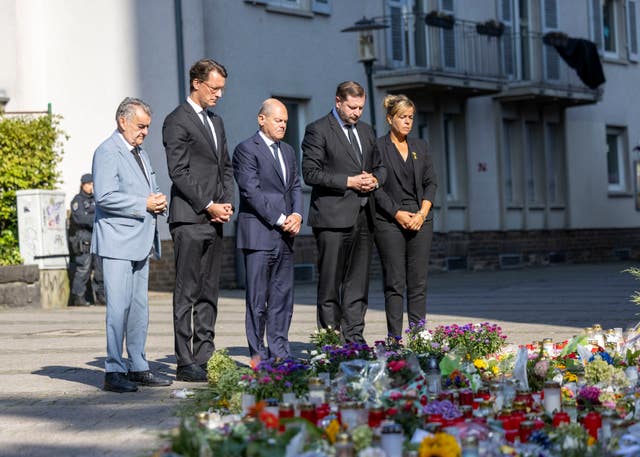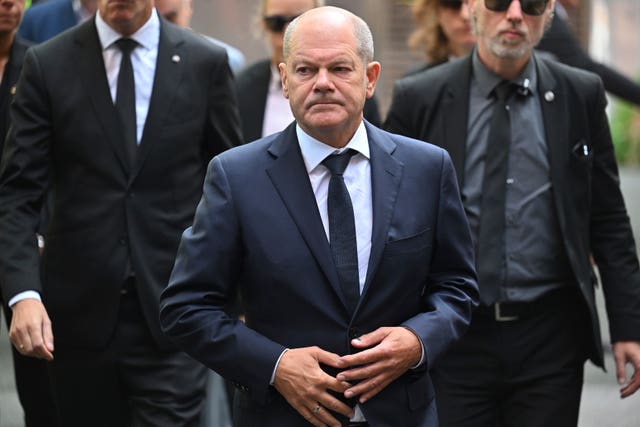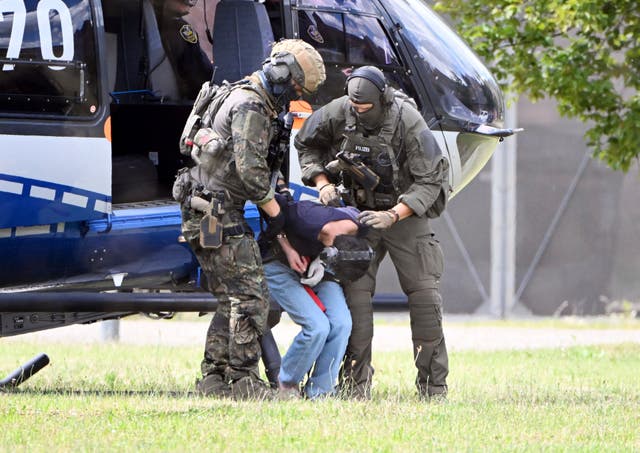German leader vows tougher knife laws and more deportations after fatal attack
Chancellor Olaf Scholz visited Solingen, where a suspected Islamic extremist from Syria is accused of stabbing three people to death.

German Chancellor Olaf Scholz vowed to toughen knife laws and step up deportations of rejected asylum-seekers on Monday as he visited the scene of the knife attack in which a suspected Islamic extremist from Syria is accused of killing three people.
Mr Scholz, speaking after he joined regional officials in laying a white flower at a makeshift memorial in the western city of Solingen, said he is “furious and angry” about the attack, in which eight other people were injured.
The suspect turned himself in to police on Saturday evening, a day after the attack at a festival marking the city’s 650th anniversary.

The 26-year-old had had his asylum application rejected and was supposed to be deported last year to Bulgaria, where he first entered the European Union, but that failed because he disappeared for a time, according to German media reports.
That has revived criticism of the government on migration and deportation, an issue on which it has long been vulnerable.
It has taken steps to defuse the issue, for example with legislation intended to ease deportations of unsuccessful asylum-seekers that was approved by politicians in January. It has also launched legislation to ease the deportation of foreigners who publicly approve of terrorist acts.
Mr Scholz said of the attack: “We must do everything to ensure that such things never happen in our country, if possible.”
He said that will include toughening knife laws in particular “and this should and will happen very quickly”.

“We will have to do everything so that those who aren’t allowed to stay in Germany are sent back and deported,” Mr Scholz said, adding that “we have massively expanded the possibilities to carry out such deportations”.
The Chancellor said there has been a 30% increase in deportations this year already, but “we will look very closely at how we can contribute to raising these figures even further”.
He said measures including border checks on Germany’s eastern frontiers have reduced the number of migrants arriving “irregularly”, but there is room for improvement there too.
Following a knife attack by an Afghan immigrant in Mannheim at the end of May that left one police officer dead and four more people injured, Mr Scholz vowed that Germany will start deporting criminals from Afghanistan and Syria again.
Germany does not currently carry out deportations to those countries. The government has no diplomatic relations with the Taliban in Kabul, and so far considers the security situation in Syria too fragile to allow deportations there.

Critics say there has been little movement since. Interior Ministry spokeswoman Sonja Kock said on Monday that the government is still working “intensively” on that.
Mr Scholz spoke alongside Hendrik Wust, the governor of North Rhine-Westphalia state and a member of Germany’s mainstream conservative opposition, which has long criticised the government on migration.
He said he is “thankful” that more action has been announced but “announcements alone won’t be enough”.
“Action must follow,” he said.
“We have people in Germany we don’t want to have here, and we must ensure that we don’t have even more coming,” he said, arguing that such migrants should be turned back at the country’s borders.
The Solingen attack came ahead of state elections this weekend in two eastern regions, Saxony and Thuringia, in which the far-right Alternative for Germany party is very strong and the parties in Mr Scholz’s three-party coalition already look set for dismal results.





